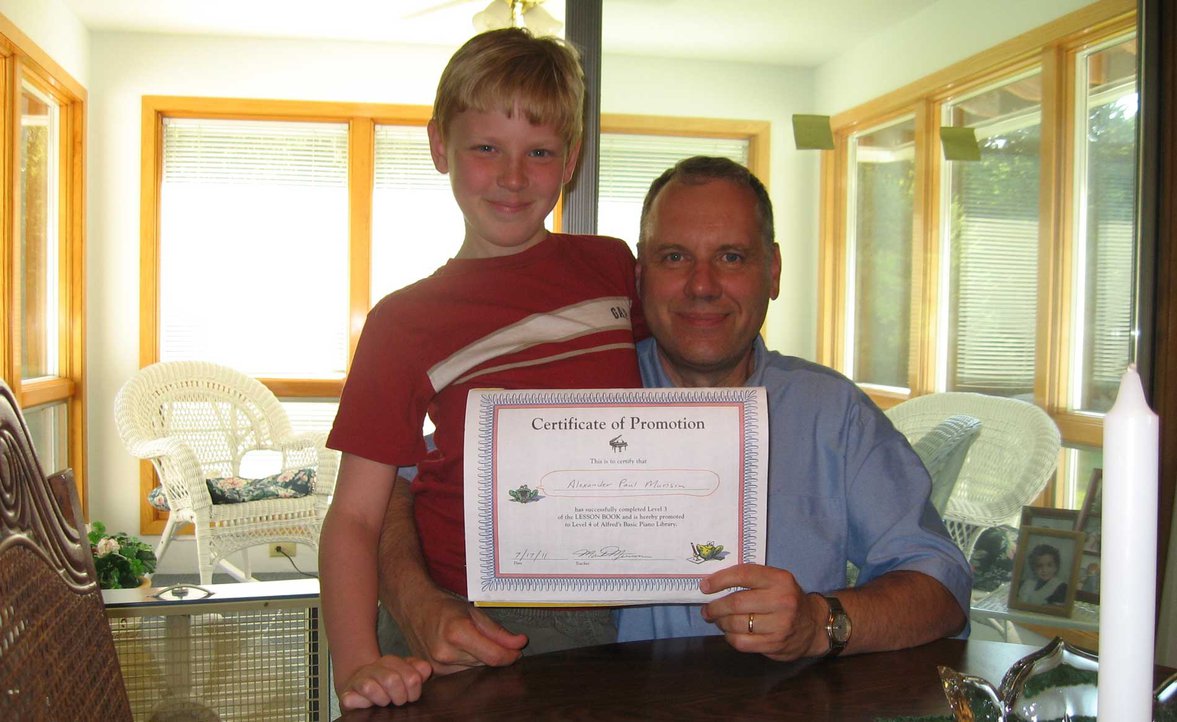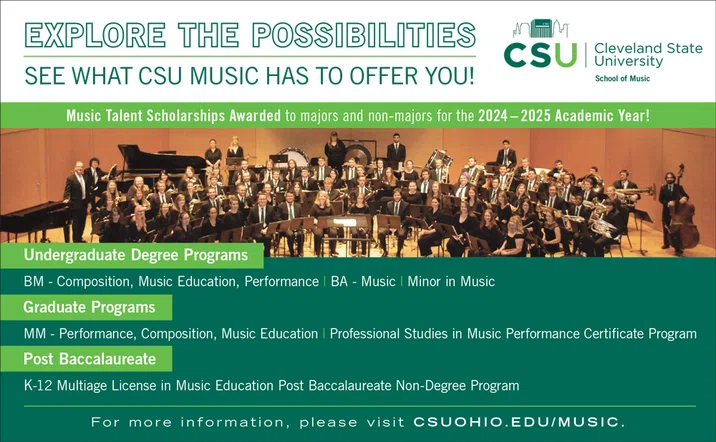©2023 Ohio Music Education Association



FEATURED ARTICLE
You Really Can Give Your Own Kids Piano Lessons!
You Really Can Give Your Own Kids Piano Lessons!
Mark Munson

Alex had heard me playing the piano since his birth. Now, with the beginners’ book open on the music rack, we would see if our six-year-old son would show an interest in learning to play himself. Without hesitation he took the bait and enthusiastically demonstrated his interest!
Conversations about teaching one’s own children to play the piano are not uncommon in my experience. Most of the time the music teachers with whom I am conversing have decided not to give their children music lessons. But I was determined. I had taken piano lessons from the time that I was eight years old and had continued throughout my college years. I also had degrees in music education, so was certainly qualified to teach beginning piano to my son.
Alex had taken a few Suzuki violin lessons when he was five, prior to our living in Sweden for a year. Those lessons, taught by a colleague of mine at the university, resumed upon our return home and were going well. Then one Sunday afternoon, the two of us sat down on the bench to give piano a try.
We worked at it for a while and made plans to do it again the following weekend. I did what I could to keep it positive as he was learning, but before long he was tense and easily frustrated, sometimes on the verge of tears. Determined that this was going to work, I knew that I had to approach the situation differently.

Thoughts of my own childhood came to mind. I am the firstborn of two perfectionist parents. Psychologist Kevin Leman warns that firstborn and only children tend to be perfectionists, many of whom become discouraged in life.* I had grown up feeling the need to do everything perfectly and I remember often being frustrated and on the verge of tears when I couldn’t do something right. Surely part of it was that my father always seemed to be looking over my shoulder ready to point out what I was doing wrong. As an adult I have come to think one reason I became a musician was that it was the one area in my life where my father, having had limited experience, had little to say or criticize. Any mistakes that I may have made at the keyboard as a child were not pointed out as I was making them. There was no way that I wanted to ruin music for my children, so I decided that I would not be constantly looking over their shoulders.
When the next Sunday afternoon came around, our firstborn and I got together at the piano. We sang letter names and counted rhythm as we played the pieces slowly together. We agreed to do it again the following weekend, and I told him that if he learned the pieces, singing the letter names and counting, he could choose stickers to put on the pages of his book.
It was during the period between the lessons that I did the two most important things. First, I resisted any temptation to comment about how my young protégé was playing during the week. If he were playing incorrect notes or rhythms, I would just let it go. Maybe he would fix things himself, or maybe I would help him at the next lesson, but I stayed entirely out of his way between lessons.
The other important step was a few times throughout the week when Alex was within earshot somewhere else in the house, I would take a minute or two to play the pieces that he was practicing so that he could hear them played correctly and musically. When the next Sunday afternoon rolled around, he was almost always playing his little pieces as he had heard me modelling them. He would not only get the sticker of his choice, but also one of those big, silly, dad kisses on his cheek. We would then preview the next piece or two that he was going to learn. Besides practicing the new pieces, each day he was to play through all of the pieces in the book that already had stickers.
Alex’s younger sister started learning piano with me a year or so after he had. The approach was similar with her. During those years my Sunday afternoons almost always included an hour of piano lessons—about half an hour with Alex and half an hour with Sarah. Both kids had a short list of allowance-related activities to be checked off each day which included time at the piano.
When all of the pieces in one of the books finally had stickers, a piano recital in our home would be planned. We would type a program and invite the grandparents, an aunt and uncle, or another friend, to hear Alex or Sarah perform all of the pieces in the book most recently completed. After each recital, which usually took 15 to 20 minutes, there was a certificate signing and there were refreshments that always included a piano cake that Dad had baked.
One of the greatest joys of my life has been giving both of my children ten years of piano lessons. The stickers and silly dad kisses ended somewhere around the time that they were in middle school, but I shall always cherish those days. I would say that both of them achieved “advanced intermediate” or “beginning advanced” proficiencies, eventually playing music slightly more challenging than Clementi sonatinas. They can play all of the major and minor scales and they can even accompany Heart and Soul in all 12 major keys! Fewer piano lessons were had by both kids after the tenth grade when the focus went to their violin playing where opportunities both inside and outside of school became more and more available.
I am proud that Alex and Sarah are well-rounded musicians. Both play piano, violin, and a band instrument, and both are singers. Alex is currently a second-year music teacher/orchestra director and Sarah continues her studies as an undergraduate violin major.
REFERENCE
*Kevin Leman, The Birth Order Book: Why You Are the Way You Are, (Grand Rapids, Michigan: Revell, a division of Baker Publishing Group, 2009), 96.
Mark Munson is on the music education faculty of Bowling Green State University where he conducts choruses and teaches choral-related classes. He enjoys playing organ and piano at the First United Methodist Church of Bowling Green, where he serves as a church musician.
SHARE ARTICLE:



